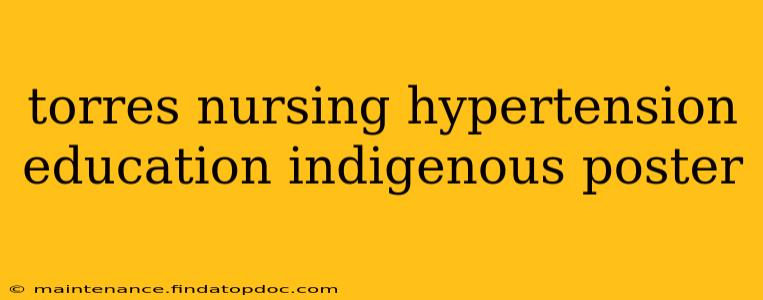Hypertension, or high blood pressure, is a significant health concern affecting Indigenous communities globally, including the Torres Strait Islander peoples. This poster aims to provide accessible and culturally relevant information to support hypertension management and promote healthy lifestyles within the Torres Strait Islander community. Understanding the unique challenges and incorporating traditional knowledge is crucial for effective health promotion.
What is Hypertension (High Blood Pressure)?
High blood pressure occurs when the force of your blood against your artery walls is consistently too high. This increased pressure puts extra strain on your heart and blood vessels, increasing your risk of serious health problems like heart attack, stroke, kidney failure, and blindness. Often, there are no noticeable symptoms, making regular check-ups vital.
Why is Hypertension a Particular Concern for Torres Strait Islanders?
Torres Strait Islander peoples experience disproportionately higher rates of hypertension compared to the non-Indigenous Australian population. This disparity is influenced by a complex interplay of factors, including:
- Genetics: Genetic predisposition can play a role in developing hypertension.
- Lifestyle factors: Diet high in salt, processed foods, and saturated fats, limited physical activity, and high rates of smoking and alcohol consumption contribute significantly.
- Socioeconomic factors: Access to healthcare, healthy food options, and safe environments for physical activity can be limited, impacting hypertension management.
- Historical trauma: The cumulative effects of colonization and historical injustices continue to influence health outcomes.
What are the risk factors for hypertension in Torres Strait Islander people?
This is a crucial question, and understanding the risk factors is key to prevention and management. Risk factors often overlap and influence each other. They include:
- Family history of hypertension: A family history significantly increases your risk.
- Age: The risk increases with age.
- Obesity: Excess weight puts extra strain on the heart and blood vessels.
- Unhealthy diet: High salt, saturated fat, and processed foods contribute to high blood pressure.
- Lack of physical activity: Regular exercise is crucial for maintaining healthy blood pressure.
- Smoking: Smoking damages blood vessels and increases blood pressure.
- Excessive alcohol consumption: Regular heavy drinking raises blood pressure.
- Stress: Chronic stress can contribute to high blood pressure.
- Diabetes: Diabetes significantly increases the risk of hypertension.
- Kidney disease: Kidney problems can affect blood pressure regulation.
How can Torres Strait Islanders manage and prevent hypertension?
Managing hypertension effectively requires a holistic approach that incorporates both western medical interventions and traditional practices.
- Regular check-ups: Regular blood pressure monitoring is essential for early detection and management.
- Healthy diet: Focus on traditional foods like fresh seafood, fruits, and vegetables, while reducing salt, processed foods, and saturated fats. Learn to cook healthy meals using traditional recipes.
- Regular exercise: Incorporate regular physical activity into your daily routine. This could include traditional games and activities.
- Smoking cessation: Quitting smoking is crucial for reducing your risk of hypertension and other health problems.
- Moderate alcohol consumption: If you drink alcohol, do so in moderation.
- Stress management: Practice stress-reducing techniques like meditation, yoga, or spending time in nature.
- Seek support: Connect with your community and healthcare providers for support and guidance.
- Embrace Traditional Healing Practices: Incorporate traditional healing practices that promote wellbeing.
What traditional healing practices can support hypertension management?
Traditional knowledge holds valuable insights into promoting health and wellbeing. Many traditional practices can complement western medicine in managing hypertension, including:
- Herbal remedies: Certain traditional plants may have properties that help lower blood pressure (consult with a healthcare provider before using any herbal remedies).
- Mindfulness and spirituality: Connecting with cultural practices and spiritual beliefs can reduce stress.
- Community support: Strong social connections within the community offer emotional support.
Conclusion
Effective hypertension management within the Torres Strait Islander community requires a collaborative effort involving healthcare providers, community leaders, and individuals. By integrating evidence-based western medical interventions with traditional knowledge and cultural practices, we can create a comprehensive approach to promoting better cardiovascular health and wellbeing for Torres Strait Islander peoples. This requires ongoing research, culturally sensitive education, and a commitment to addressing the social determinants of health.
